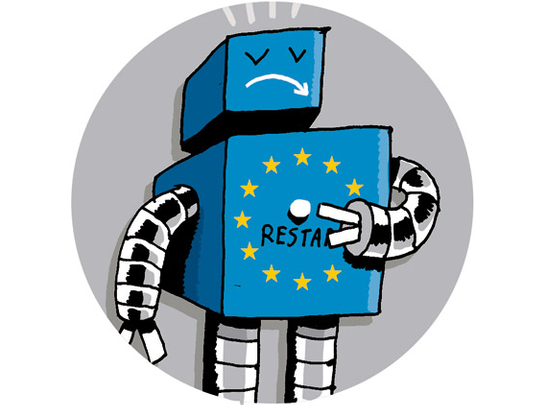
It was supposed to be a final act. The Lisbon Treaty, successor to the ill-fated European Union (EU) constitution, which in turn followed the Maastricht, Amsterdam and Nice treaties, would create a permanent club rulebook.
"We expect no change in the foreseeable future," European leaders declared in December 2007. Freed from its internal wrangling, the EU would be able to turn outward and face the real world. Instead, the real world threw up the euro-zone debt crisis. And less than a year after the Lisbon Treaty came into force, the EU is talking of a new treaty.
Brussels' favourite game has been restarted by President Nicolas Sarkozy of France and the German Chancellor Angela Merkel. At their summit in the French resort of Deauville (where they also met Russia's President Dmitry Medvedev) last week, they declared that, in order to deal with future debt crises, "it is necessary to revise the treaty". What fun.
The idea of reopening the treaties had seemed merely to be a preposterous German obsession. Berlin was demanding that spendthrift countries in breach of the euro zone's fiscal limits (deficits at 3 per cent of GDP and public debt at 60 per cent of GDP) be threatened with losing their EU voting rights.
Last month the European Commission focused instead on measures that could be implemented under existing treaties. It proposed intensified monitoring of countries' budgets and economic imbalances, plus a system of escalating warnings and sanctions that would be imposed "semi-automatically": sinning countries would be punished unless finance ministers voted by a qualified (weighted) majority to stop the proposed sanctions.
These proposals were largely inspired by the austere Germans. Fiscal hawks fumed about German betrayal. Led by the Dutch, they fought a rearguard action to preserve something of the semi-automatic weapon.
What deal did Germany cut with France? Part of the answer came that evening from Deauville: France changed its mind and now supported a new treaty. Yet critics see this as a bad bargain.
Germany has surrendered feasible sanctions for the promise of a treaty that may never pass. Few governments, or their voters, will vote to disenfranchise themselves. Yet more than just amending voting rights, Germany's real goal is to create a permanent means of restructuring the debts of bust countries and a bail-out fund that is treaty-based.
Many want them made permanent. But Germany refuses to extend them beyond 2013 without some system to deal with insolvent states.
Strict conditions
Germany's well-being is bound up with the fate of the euro; it saved Greece partly to help itself. But without strict conditions on profligate states and the imposition of losses on reckless creditors, all are taking a free ride on Germany.
Some say that a formal debt-restructuring system will raise the cost of borrowing and frighten skittish markets. But even France recognises that Germany has a case. The odds are that others will, grudgingly, agree.
All will want only a limited treaty change, perhaps one that applies only in the euro zone. But past experience suggests that such keyhole surgery may prove impossible. The European Parliament will want more power. Ireland will almost certainly have to put any new treaty to a referendum.
Many wonder why Merkel wants to tread into such a minefield. Perhaps, after the unpopular Greek bail-out, she needs to show she can hold spendthrift states to account. A more important reason is that Germany's constitutional court is concerned about German-financed bail-outs, so a lawyer-proof system is needed.
Many thought it would be best to wait for bond markets to calm down before tinkering with the rules. But others say that if treaty amendment is needed, it is best to get on with it.
A new text would best be negotiated before the 2012 French presidential election, and ratified before Germany's 2013 election.
Don't count on this being the final word, either. The European ‘construction' is a half-built project. The EU's members are part-integrated and part-sovereign, and the contradictions cause inevitable upheavals. Brussels' instinctive response to the threat of disintegration is further integration. Europe may not be in a state of permanent revolution, but it is in permanent renegotiation.










